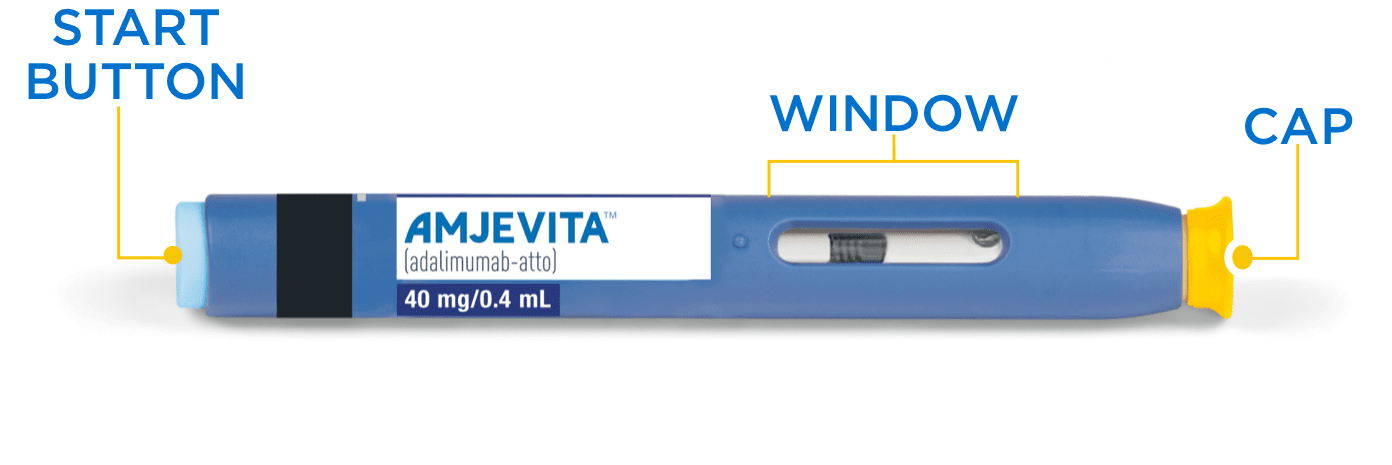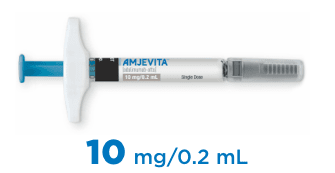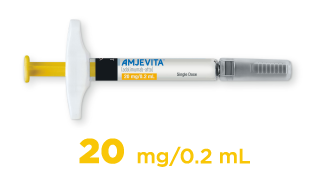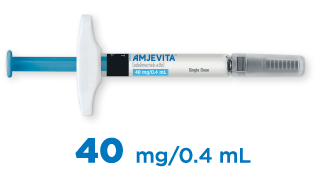References: 1. AMJEVITA®
(adalimumab-atto)
Prescribing Information, Amgen Inc.
2. HUMIRA® (adalimumab) Prescribing Information, AbbVie Inc.
References: 1.
AVSOLA® (infliximab-axxq)
Prescribing Information, Amgen Inc.
2. AMJEVITA® (adalimumab-atto) Prescribing
Information, Amgen Inc. 3.
KANJINTI® (trastuzumab-anns) Prescribing Information, Amgen Inc. 4. MVASI®
(bevacizumab-awwb) Prescribing Information, Amgen Inc. 5.
RIABNI®
(rituximab-arrx) Prescribing Information, Amgen Inc. 6.
Biosimilar product information. U.S. Food and Drug Administration.
https://www.fda.gov/drugs/biosimilars/biosimilar-product-information. Accessed November 26, 2024.
7. Data on file, Amgen [Biosimilars Product Sales]; 2022. 8.
Data on file, Amgen [Biosimilars Patient Counts]; 2024. 9.
Data on file, Amgen [$2 billion Invested]; 2019.
References:
1. U.S Food and Drug Administration. FDA Approval Letter interchangeable - AMJEVITA 20 mg and 80
mg. https://www.accessdata.fda.gov/drugsatfda_docs/appletter/2025/761024Orig1s023ltr.pdf. Accessed May
27, 2025.
2. U.S Food and Drug Administration. FDA Approval Letter interchangeable - AMJEVITA 40 mg HCF.
https://www.accessdata.fda.gov/drugsatfda_docs/appletter/2025/761024Orig1s021ltr.pdf. Accessed May 27,
2025.
3. U.S Food and Drug Administration. FDA Approval Letter interchangeable - AMJEVITA 10mg, 20mg,
40mg and 80mg LCF. https://www.accessdata.fda.gov/drugsatfda_docs/appletter/2024/761024Orig1s019ltr.pdf.
Accessed May 27, 2025.
4. Cohen S, Genovese MC, Choy E, et al. Efficacy and safety of the biosimilar ABP 501 compared
with adalimumab in patients with moderate to severe rheumatoid arthritis: a randomised, double-blind,
phase III equivalence study.
Ann Rheum Dis. 2017;76:1679-1687.
5. Papp K, Bachelez H, Costanzo A, et al. Clinical similarity of the biosimilar ABP 501 compared
with adalimumab after single transition: long-term results from a randomized controlled, double-blind,
52-week, phase III trial in patients with moderate-to-severe plaque psoriasis.
Br J Dermatol. 2017;177:1562-1574.
6. Cohen S, Pablos JL, Pavelka K, et al. An open-label extension study to demonstrate long-term
safety and efficacy of ABP 501 in patients with rheumatoid arthritis.
Arthritis Res Ther. 2019;21(84). doi:10.1186/s13075-019-1857-3
7. Data on file, Amgen [Biosimilars Patient Counts]; 2024.
8. Amgen. Press release. Amgen launches AMGEVITA® (biosimilar adalimumab) in markets
across Europe. October 15, 2018. www.amgen.com/newsroom/press-releases/2018/10/amgen-launches-amgevita-biosimilar-adalimumab-in-markets-across-europe. Accessed May 27, 2025.
9. U.S. Food and Drug Administration. Press release. FDA approves Amjevita, a biosimilar to
Humira. September 23, 2016. https://www.fda.gov/news-events/press-announcements/fda-approves-amjevita-biosimilar-humira. Accessed May 27, 2025.
References: 1. AMJEVITA®
(adalimumab-atto) Prescribing Information, Amgen Inc. 2. Humira® (adalimumab)
Prescribing
Information, AbbVie Inc.
References: 1. AMJEVITA® (adalimumab-atto)
Prescribing
Information, Amgen Inc.
2. HUMIRA® (adalimumab) Prescribing Information, AbbVie
Inc. 3. Cohen S, Genovese
MC, Choy E, et al. Efficacy and safety of the biosimilar ABP 501 compared with adalimumab in patients
with
moderate to severe rheumatoid arthritis: a randomised,
double-blind, phase III equivalence study. Ann Rheum Dis. 2017;76:1679-1687.
4. Cohen S, Pablos JL, Pavelka K, et al. An open-label extension study to demonstrate long-term
safety and efficacy of ABP 501 in patients with rheumatoid arthritis. Arthritis Res Ther.
2019;21(84). doi:10.1186/s13075-019-1857-3 5. Data on file, Amgen [CSR
20130262]; 2015. 6. Data on file, Amgen [CSR 20130258]; 2016. 7. Papp K, Bachelez H,
Costanzo
A, et al. Clinical similarity of the biosimilar ABP 501 compared with
adalimumab after single transition: long-term results from a randomized controlled, double-blind,
52-week,
phase III trial in patients with moderate-to-severe plaque
psoriasis. Br J Dermatol. 2017;177:1562-1574. 8. Data on file, Amgen [CSR 20120263]; 2015.
9. US Food and Drug Administration. Guidance for industry: scientific
considerations in demonstrating biosimilarity to a reference product.
www.fda.gov/downloads/drugs/guidances/ucm291128.pdf Accessed October
27, 2022. 10.
Lai Z, La
Noce A. Key design considerations on comparative clinical efficacy studies for biosimilars: adalimumab
as an
example. RMD Open. 2016;2:e000154. doi:10.1136/
rmdopen-2015-000154 11. Mysler E, Pineda C, Horiuchi T, et al. Clinical and regulatory
perspectives
on biosimilar therapies and intended copies of biologics in
rheumatology. Rheumatol Int. 2016;36:613-625. 12. Liu J, Eris T, Li C, Cao S, Kuhns S.
Assessing analytical similarity of proposed Amgen biosimilar ABP 501 to adalimumab.
BioDrugs. 2016;30:321-338. 13. Velayudhan J, Chen Y-F, Rohrbach A, et al. Demonstration of
functional similarity of ABP 501 to adalimumab. BioDrugs. 2016;30:339-351.
14.
Kaur P, Chow V, Zhang N, et al. A randomised, single-blind, single-dose, three-arm, parallel-group study
in
healthy subjects to demonstrate pharmacokinetic
equivalence of ABP 501 and adalimumab. Ann Rheum Dis. 2017;76:526-533.







